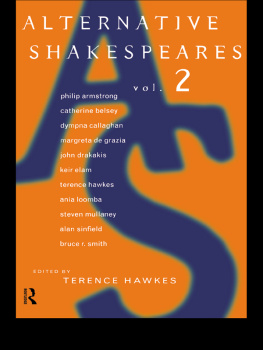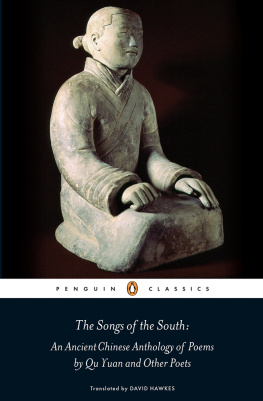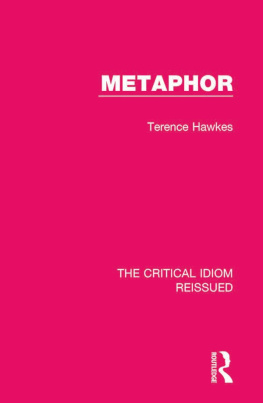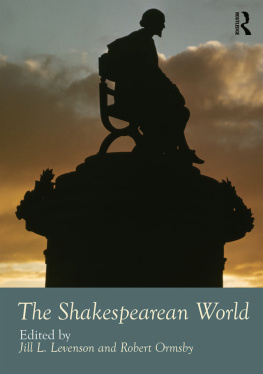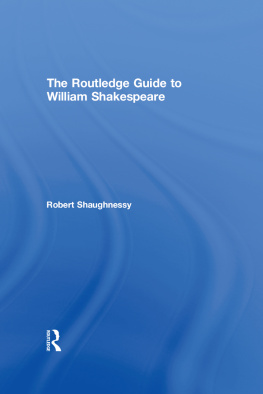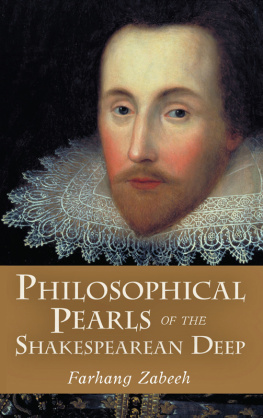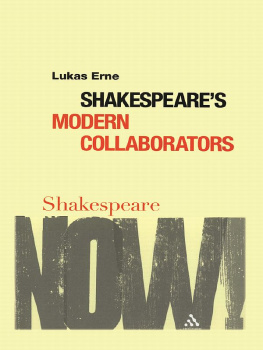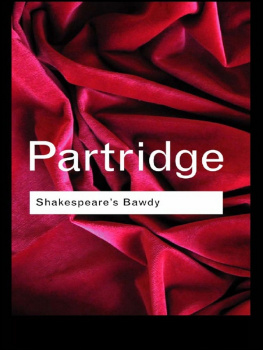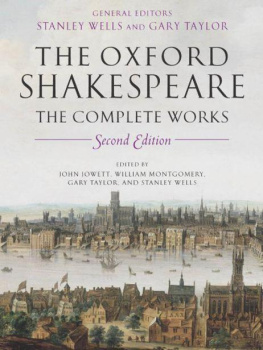NEW ACCENTS
General Editor: TERENCE HAWKES
Alternative Shakespeares
IN THE SAME SERIES
The Empire Writes Back: Theory and practice in post-colonial literatures Bill Aschcroft, Gareth Griffiths, and Helen Tiffin
Translation Studies Susan Bassnett
Critical Practice Catherine Belsey
Formalism and Marxism Tony Bennett
Dialogue and Difference: English for the nineties ed. Peter Brooker and Peter Humm
Telling Stories: A theoretical analysis of narrative fiction Steven Cohan and Linda M. Shires
The Semiotics of Theatre and Drama Keir Elam
Reading Television John Fiske and John Hartley
Making a Difference: Feminist literary criticism ed. Gayle Greene and Copplia Kahn
Superstructuralism: The philosophy of structuralism and post-structuralism Richard Harland
Structuralism and Semiotics Terence Hawkes
Subculture: The meaning of style Dick Hebdige
Dialogism: Bakhtin and his world Michael Holquist
The Politics of Postmodernism Linda Hutcheon
Fantasy: The literature of subversion Rosemary Jackson
Sexual/Textual Politics: Feminist literary theory Toril Moi
Deconstruction: Theory and practice Christopher Norris
Orality and Literacy Walter J. Ong
Narrative Fiction: Contemporary poetics Shlomith Rimmon-Kenan
Adult Comics: An introduction Roger Sabin
Criticism in Society Imre Salusinszky
Metafiction Patricia Waugh
Psychoanalytic Criticism: Theory in practice Elizabeth Wright
Alternative Shakespeares ed. John Drakakis
Alternative Shakespeares
Volume 2
Edited by
TERENCE HAWKES
First published 1996 by Routledge 11 New Fetter Lane, London EC4P 4EE
This edition published in the Taylor & Francis e-Library, 2005.
To purchase your own copy of this or any of Taylor & Francis or Routledges collection of thousands of eBooks please go to www.eBookstore.tandf.co.uk.
Simultaneously published in the USA and Canada by Routledge 29 West 35th Street, New York, NY 10001
Routledge is an International Thomson Publishing company
1996 Terence Hawkes, selection and editorial matter; the contributors, individual chapters. Terence Hawkes asserts his moral right to be identified as the editor of this work.
All rights reserved. No part of this book may be reprinted or reproduced or utilized in any form or by any electronic, mechanical, or other means, now known or hereafter invented, including photocopying and recording, or in any information storage or retrieval system, without permission in writing from the publishers.
British Library Cataloguing in Publication Data
A catalogue record for this book is available from the British Library
Library of Congress Cataloguing in Publication Data
A catalogue record for this book has been requested
ISBN 0-203-42709-2 Master e-book ISBN
ISBN 0-203-44135-4 (Adobe eReader Format)
ISBN 0-415-13486-2 (Print Edition)
Illustrations
Contributors
Philip Armstrong: Lecturer in English, University of Auckland, New Zealand
Catherine Belsey: Professor of English, University of Wales, Cardiff
Dympna Callaghan: Associate Professor of English, University of Syracuse, New York
Margreta de Grazia: Professor of English, University of Pennsylvania
John Drakakis: Reader in English, University of Stirling
Keir Elam: Professor of English, University of Florence, Italy
Terence Hawkes: Professor of English, University of Wales, Cardiff
Ania Loomba: Associate Professor of English, Jawaharlal Nehru University, New Delhi, India
Steven Mullaney: Associate Professor of English, University of Michigan, Ann Arbor
Alan Sinfield: Professor of English, University of Sussex
Bruce R. Smith: Professor of English, Georgetown University, Washington D.C.
General editors preface
How can we recognize or deal with the new? Any equipment we bring to the task will have been designed to engage with the old: it will look for and identify extensions and developments of what we already know. To some degree the unprecedented will always be unthinkable.
The New Accents series has made its own wary negotiation around that paradox, turning it, over the years, into the central concern of a continuing project. We are obliged, of course, to be bold. Change is our proclaimed business, innovation our announced quarry, the accents of the future the language in which we deal. So we have sought, and still seek, to confront and respond to those developments in literary studies that seem crucial aspects of the tidal waves of transformation that continue to sweep across our culture. Areas such as structuralism, post-structuralism, feminism, Marxism, semiotics, subculture, deconstruction, dialogism, postmodernism, and the new attention to the nature and modes of language, politics and way of life that these bring, have already been the primary concern of a large number of our volumes. Their nuts and bolts exposition of the issues at stake in new ways of writing texts and new ways of reading them has proved an effective statagem against perplexity.
But the questions of what texts are or may be has also become more and more complex. It is not just the impact of electronic modes of communication, such as computer networks and data banks, that has forced us to revise our sense of the sort of material to which the process called reading may apply. Satellite television and supersonic travel have eroded the traditional capacities of time and space to confirm prejudice, reinforce ignorance, and conceal significant difference. Ways of life and cultural practices of which we had barely heard can now be set compellingly besidecan even confrontour own. The effect is to make us ponder the culture we have inherited; to see it, perhaps for the first time, as an intricate, continuing construction. And that means that we can also begin to see, and to question, those arrangements of foregrounding and back-grounding, of stressing and repressing, of placing at the centre and of restricting to the periphery, that give our own way of life its distinctive character.
Small wonder if, nowadays, we frequently find ourselves at the boundaries of the precedented and at the limit of the thinkable: peering into an abyss out of which there begin to lurch awkwardlyformed monsters with unaccountableyet unavoidabledemands on our attention. These may involve unnerving styles of narrative, unsettling notions of history, unphilosophical ideas about
philosophy, even unchildish views of comics, to say nothing a host of barely respectable activities for which we have no reassuring names.
In this situation, straightforward elucidation, careful unpicking, informative bibliographies, can offer positive help, and each New Accents volume will continue to include these. But if the project of closely scrutinizing the new remains nonetheless a disconcerting one, there are still overwhelming reasons for giving it all the consideration we can muster. The unthinkable, after all, is that which covertly shapes our thoughts.
TERENCE HAWKES
Acknowledgements
Collections such as this depend wholly on the energy, goodwill and cooperation of individual contributors. Everyone involved in the present volume gave unstintingly of those resources in addition to the scholarship and critical acumen for which they had been recruited. They deserve my warmest thanks. The enthusiastic help of John Drakakis in the planning and development of the project was crucial as well as characteristic. For the period of study leave which enabled me fully to engage with it, I am extremely grateful to my colleagues at the University of Wales, Cardiff. My greatest debt of gratitude remains, as always, to my wife.

